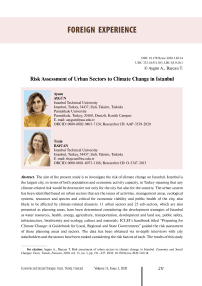Risk assessment of urban sectors to climate change in Istanbul
Автор: Aygn Aysun, Baycan Tzin
Журнал: Economic and Social Changes: Facts, Trends, Forecast @volnc-esc-en
Рубрика: Foreign experience
Статья в выпуске: 3 т.13, 2020 года.
Бесплатный доступ
The aim of the present study is to investigate the risk of climate change on Istanbul. Istanbul is the largest city, in terms of both population and economic activity capacity, in Turkey meaning that any climate-related risk would be destructive not only for the city but also for the country. The urban system has been identified based on urban sectors that are the issues of activities, management areas, ecological systems, resources and species and critical for economic viability and public health of the city, also likely to be affected by climate-related disasters. 11 urban sectors and 25 sub-sectors, which are also presented as planning areas, have been determined considering the development strategies of Istanbul as water resources, health, energy, agriculture, transportation, development and land use, public safety, infrastructure, biodiversity and ecology, culture and materials. ICLEI’s handbook titled “Preparing for Climate Change: A Guidebook for Local, Regional and State Governments” guided the risk assessment of these planning areas and sectors. The data has been obtained via in-depth interviews with city stakeholders and the sectors have been ranked considering the risk factors of each. The results of this study reveal the urban sectors that are under the greatest and lowest risk due to the impacts of climate change. Highlighting the climate change risk on vital sectors of Istanbul is essential for decision makers to develop further strategies to mitigate the impacts of climate change and adapt the upcoming impacts.
Climate change, risk assessment, urban resilience, istanbul
Короткий адрес: https://sciup.org/147225464
IDR: 147225464 | УДК: 332.14:551.583 | DOI: 10.15838/esc.2020.3.69.14
Список литературы Risk assessment of urban sectors to climate change in Istanbul
- Tompkins E.L., Adger W.N. Does adaptive management of natural resources enhance resilience to climate change? Ecology and society, 2004, no. 9(2): 10.
- Evans J.P. Resilience, ecology and adaptation in the experimental city. Transactions of the institute of British Geographers, 2011, no. 36(2), pp. 223–237.
- Norman B. A Low Carbon and Resilient Urban Future: An Integrated Approach to Planning for Climate Change, 2010.
- Pamukcu K. Turkey’s Post-Kyoto Climate Change Policy. University of Phoenix-Chicago, 2010.
- Aygün A., Baycan T. Istanbul’s vulnerability to climate change: An urban sectors’ based assessment. In: Handbook of Climate Change Communication. Vol. 3. Springer, Cham, 2018. Pp. 361–383. ISBN: 978-3-319-70478-4
- Wamsler C., Brink E., Rivera C. Planning for climate change in urban areas: From theory to practice. Journal of Cleaner Production, 2013, no. 50, pp. 68–81.
- Wisner B. et al. The Challenge of Disasters and our Approach. At Risk: Natural Hazards, People’s Vulnerability and Disasters. 2nd ed. London: Routledge, 2004. Pp. 3–48.
- Hansen J. et al. Global surface temperature change. Rev. Geophys., 2010, no. 48, RG4004. DOI:10.1029/2010RG000345.
- Carter, J. G., et al. Climate change and the city: Building capacity for urban adaptation. Progress in Planning, 2015, no. 95, pp. 1–66.
- Jabareen Y. Planning the resilient city: Concepts and strategies for coping with climate change and environmental risk. Cities, 2013, no. 31, pp. 220–229.
- Meerow S., Newell J.P., Stults M. Defining urban resilience: A review. Landscape and Urban Planning, 2016, no. 147, pp. 38–49.
- Cannon T., Müller D. Vulnerability, resilience and development discourses in context of climate change. Natural Hazards, 2010, no. 55(3), pp. 621–635.
- Morss R.E. et al. Improving societal outcomes of extreme weather in a changing climate: an integrated perspective. Annual Review of Environment and Resources, 2011, no. 36, pp. 1–25.
- Rosenzweig C. et al. (ed.). Climate Change and Cities: First Assessment Report of the Urban Climate Change Research Network. Cambridge University Press, 2011.
- Coppola D.P. Introduction to International Disaster Management. Elsevier, 2006.
- Gallina V. et al. A review of multi-risk methodologies for natural hazards: Consequences and challenges for a climate change impact assessment. Journal of Environmental Management, 2016, no. 168, pp. 123–132.
- Snover A.K. et al. Preparing for Climate Change: A Guidebook for Local, Regional, and State Governments, 2007.
- Gündüz A. et al. How imminent is the earthquake expected in Istanbul? And how potentially deadly? The Journal of Academic Emergency Medicine, 2015, no. 14(2), pp. 99–102.


